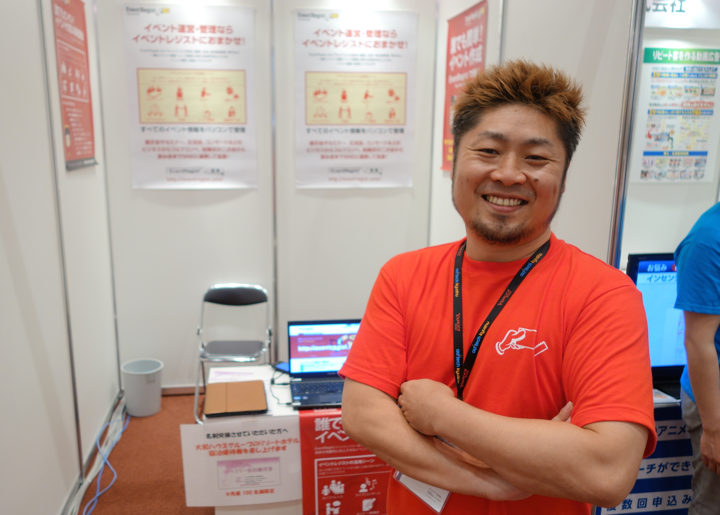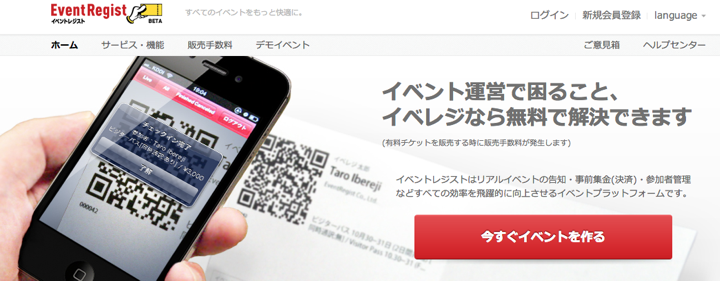
Think you’re past your entrepreneurial prime? Think again. Not all successful startups are born in dorm rooms and founded by 20-somethings. Kosuke Hirayama, the CEO of event marketing service EventRegist, is proof that playing the long game can be just as effective.
Hirayama, 41, put in more than a decade of work at some of the biggest tech companies in the world before founding his own company. After attending high school in the US and receiving a bachelor’s degree from California State University, he headed back to Japan and joined Yahoo as a producer in 2000 – back when the number one domestic search engine had just 300 employees. He would later move to Microsoft, then Google, before joining a subsidiary of Tokyo Broadcasting System (TBS) as a television producer – with a focus on bridging the gap between TV and the internet.
In 2011, Hirayama broke away from the corporate life to create EventRegist. Each of the company’s four co-founders are former colleagues from his days at Yahoo, Microsoft, and Google.
“We’re all thankful to those companies,” Hirayama tells Tech in Asia. “We gained a lot of experience and learned a lot by working for the big guys. Most of us are in our late 30s now, so we’re not necessarily like the young guys starting something in their dorm rooms. We might be a little bit late as far as ‘startup age,’ but we can move fast thanks to our experience at those big companies.”
He adds: “Especially when it comes to going B2B, startups need experience. We have a shortcut because we know exactly how the business side works.”
Live experience
EventRegist is a one-stop-shop for creating events, selling tickets, and managing attendees. The online service (with companion apps for iOS, Android, and Windows phones) also allows event planners to choose a custom URL for their event page, add widgets to their personal or business site, view real-time event data (i.e. how many people are at the event right now compared to total tickets sold), and more. Hirayama was inspired to enter the events space for two reasons: dissatisfaction with traditional “offline” B2B event planning services and the importance of what he calls “live experience.”
Today, we are living in a digital era – everything is digital. At the same time, we believe that the importance of live events will increase. Every kind of content – TV, music, pictures, videos, and so on – can be digitized and copied. The live experience, actually meeting up with people, cannot be copied.
EventRegist has helped organize some of the biggest tech-related events in Japan: the New Economy Summit (spearheaded by Rakuten’s Hiroshi Mikitani and attended by Prime Minister Shinzo Abe), Tokyo Game Show, SoftBank World, Ceatec Japan, and TechCrunch Tokyo, just to name a few. The startup’s work extends beyond Japan – and beyond tech. Last year, the company organized a sumo wrestling tournament in Jakarta, as well as the recent Nikkei Asian Review Forum in Singapore.
You don’t need to be a bigwig to benefit from the service, either. EventRegist doesn’t charge a handling fee for free events. If you put a price on your tickets, the company takes an eight percent cut. San Francisco-based Eventbrite, an international heavyweight in the event planning space that has raised nearly US$200 million in 10 funding rounds since 2006, charges 2.5 percent plus $0.99 per ticket – in addition to a 3 percent processing fee if you opt to pay with plastic. Domestic rival Peatix charges 2.9 percent plus 70 yen (US$0.67) per transaction.
Hirayama explains that EventRegist’s flat-rate system, without any hidden fees, isn’t necessarily more expensive than rival services with lower percentages and per-ticket costs. For example, if a small event costs 1000 yen, in the case of Peatix, that’s 1000 yen x 2.9 percent plus 70 yen – or 99 yen per ticket. Using EventRegist, 1000 yen x 8 percent comes to only 80 yen per ticket.
For large-scale events that may cost more, Hirayama says that organizers are willing to splurge on great customer service.
“Our goal is to solve event organizers’ issues. In other words, adding value is important, not just selling tickets. The percentage of a ticketing fee is not such a big deal among all of the other issues event organizers face. Customers are willing to pay more if the system solves more their concerns better – things like providing a faster registration system, getting more sponsors,
increasing the number of attendees, securing better venues, and so on. Many great brands are choosing our platform, so that’s already proof that the fee is not a major factor.”

Capitalizing on change
Hirayama points to two relatively recent tech-driven changes to the international landscape that make an event planning business more viable than ever: the rise of social media and widespread acceptance of electronic payments.
“Social media, which didn’t exist much when I was getting my start in tech, is driving the events industry,” he says. “Now each person has influence – anyone can gather people and create an event. I think this movement is only going to grow since social media users are increasing. Before it was on Mixi, now it’s on Twitter and Facebook. I can’t predict the future, but maybe something like Line will usher in the next phase of social event planning.”
Compared with five years ago, Hirayama adds that more people – especially those in Japan – are making purchases online using credit cards. Chalk it up to the rise of Amazon and Rakuten, but EventRegist benefits from the lowered reluctance to make a digital payment.
Speaking of Japan, most business people attending corporate events don’t want to use their personal credit cards. EventRegist allows people to get an invoice and bill their employer directly instead of shelling out from their own pocket – an important addition to the company’s domestic service.
See: Peatix founder talks about his one strategy for success
High expectations
At its inception, EventRegist was bootstrapped by the co-founders. The startup received an initial seed round from Daiwa House and a second seed from East Ventures (see disclosure below) and Skyland Ventures. Hirayama and his team are currently in the midst of a series A round, led by Nikkei, to the tune of US$1.6 million. They expect to close the round by the end of the year and are looking at both domestic and foreign VCs.
Approximately 90 percent of EventRegist’s clients are in Japan. Hirayama says that the company hopes to grow abroad, setting a goal of having 50 percent of its clientele outside of Japan within four years.
“My focus is on the international market, especially Asia,” he says. “If we only provide service in Japanese, we can only work in the domestic market. Adding English expands the potential a lot, but not enough. We also support Chinese, Indonesian, and Thai – but going global creates a challenge.”
Hirayama explains:
The expectations for Japanese service are very high – the idea of omotenashi (a Japanese term for flawless, almost psychic customer service) is huge these days, so we have to make things more friendly more easy. Corporate clients, especially, have very high expectations and don’t allow any mistakes.
EventRegist opened an office in Indonesia in 2012 and launched its Singapore branch last month. The company is also setting up a development lab in Hanoi.
Disclosure: East Ventures is an investor in Tech in Asia. See our ethics page for more information.
The post EventRegist’s founder didn’t let a successful career stop him from starting up appeared first on Tech in Asia.
EventRegist’s founder didn’t let a successful career stop him from starting up
No comments:
Post a Comment